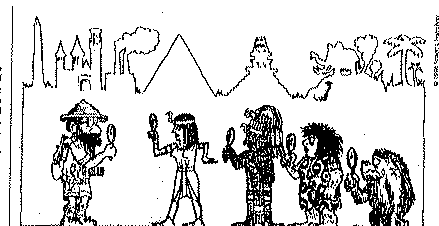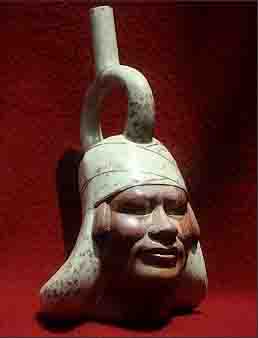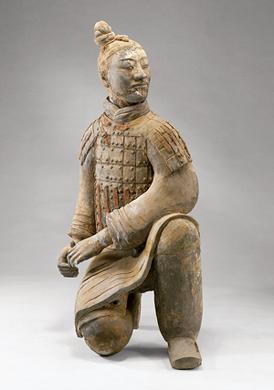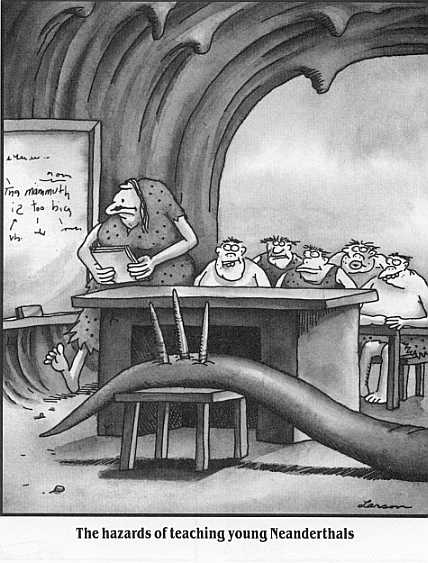ANTHROPOLOGY
125
BURIED CITIES AND LOST
TRIBES
COURSE
SYLLABUS
SPRING
2024 - T & TH 2:50 PM-4:15 PM -
LH 2
Return to Anthropology
125 Home Page

Randy McGuire rmcguire@binghamton.edu
Sci.1 228, 777-2100 Office hrs: T 4:30-5:30 PM, W 10:30-11:30 AM, or by appointment
I will hold simultaneous office hours in Sci. 1, 228 and on zoom https://binghamton.zoom.us/j/9205378216
Video Lectures
In the spring of 2021, I taught this course as an online course. I produced the Panopto Videos in the Brightspace Module as lectures for remote learning. Because the pandemic is still with us, I anticipate that we will have frequent absences as students either contract COVID or go into isolation if they come in contact with someone who has the disease. I am providing these videos as a way for students affected by the pandemic to keep up with the class. They are also available to healthy students as a mechanism for review. If we miss any lectures due to snow days, I will assign the appropriate lectures as make ups for the missing class(es). Unless specifically assigned as make ups, the video lectures are not required viewing.
These videos do not replace the in-person lectures. I urge you to attend these lectures. I am much more engaging speaking in person than I am sitting and speaking to a computer. I will not be updating the video lectures or replacing broken links to media. My class room presentations may include materials not in the video and visa versa (I will inform you of any such changes in the live class). In the live class, I welcome any questions or comments that you might have.
Each video lecture will drop at 1:00 AM, the day after I present the topic in class.
As an educator, I support the rights of DACA students, unDACAmented students, and students from mixed status families to an education. If you have any concerns in that regard, feel free to discuss them with me, and I will respect your wishes concerning confidentiality.
 Welcome to Buried
Cities and Lost Tribes. The variations and differences in cultures that we see
around the world today are the result of a very long history of separate
developments and of global interdependencies. We write this history in the
present and different cultural groups, nations, and peoples have created
histories as part of their efforts to define their civilizations in the modern
world. Buried Cities and Lost Tribes examines how civilizations are
founded and maintained both in the past and through the creation and recreation
of heritage. The course will use archaeology to examine the concept of
heritage as a central feature of Western Civilization from its beginnings until
the present time. This examination will occur in a comparative context of
other world civilizations, such as the Chinese, African, Indian, and Native
American, beginning with the origin of humans and concluding with the modern
world. This comparison will examine both how other civilizations create
and use heritage and how Western Civilization has interpreted the heritage of
these "others" to define itself. Topics in the course will include
foundational aspects of the development of heritage, gender relations, literacy,
social structure, art, agriculture, and religion, among others.
Welcome to Buried
Cities and Lost Tribes. The variations and differences in cultures that we see
around the world today are the result of a very long history of separate
developments and of global interdependencies. We write this history in the
present and different cultural groups, nations, and peoples have created
histories as part of their efforts to define their civilizations in the modern
world. Buried Cities and Lost Tribes examines how civilizations are
founded and maintained both in the past and through the creation and recreation
of heritage. The course will use archaeology to examine the concept of
heritage as a central feature of Western Civilization from its beginnings until
the present time. This examination will occur in a comparative context of
other world civilizations, such as the Chinese, African, Indian, and Native
American, beginning with the origin of humans and concluding with the modern
world. This comparison will examine both how other civilizations create
and use heritage and how Western Civilization has interpreted the heritage of
these "others" to define itself. Topics in the course will include
foundational aspects of the development of heritage, gender relations, literacy,
social structure, art, agriculture, and religion, among others.
This course is an introductory course, intended for
non-anthropology majors, although anthropology majors may take the course for
credit. The course is also appropriate for non-matriculated students who
simply wish to learn something about popular issues in archaeology. Anthro 125 counts as a Global Interdependencies course (G) in the Undergraduate
General Education program at Binghamton University or as a Social Science course
(N). It counts towards the requirements for social science division course
work in Harpur College. This course counts as a W course to help fulfill the
Harpur College writing requirement.
 ORGANIZATION
ORGANIZATION
Buried Cities and Lost
Tribes is organized into three sections. The first section discusses how
archaeologists study civilization.We will talk about Howard Carter and King Tut,
the origins of archaeology and Pompeii, Richard Wetherill and the cliff
dwellings of the American Southwest, and Heinrich Schlieman at Troy. These
famous examples will be used to introduce the centrality of heritage to the
definition of civilization. The second section of the course considers
some of the major theories advanced to account for the long run of human history
and some of the major issues of Western heritage in human history and
prehistory. The theories include popular topics like ancient astronauts,
as well as more academic ideas such as cultural evolution, and historical
materialism. Then we will consider how a number of issues including the
origins of human culture, the origins of agriculture, the origins of art, and
the stone age relate to the foundations of Western and other
civilizations. The final section of the course presents a comparative
study of heritage issues in Western Civilization and the rest of the
world. We will discuss the ancient civilizations of the Nile and Near
East, Stonehenge, the peopling of North America, cannibalism, the Maya, the
Inca, and modern garbage. In each of these sections, we will examine how
global relations developed between cultures and how people create heritage in
the context of global interdependencies.
REQUIREMENTS
 Attendance: The course will be taught with
a combination of lectures and discussion sections. The lectures will make
frequent use of slides and we will see several movies during the semester.
All students are required to attend two, one and a half hour lectures a week in the lecture hall and
once a week you will attend a discussion section led by a Teaching Assistant
(TA). You must have an excused absence to miss a discussion section. If you miss class more than twice you must present your TA with proof of your excuse or we will deduct 5 points from your grade for the third and each subsequent absence you cannot prove.
Attendance: The course will be taught with
a combination of lectures and discussion sections. The lectures will make
frequent use of slides and we will see several movies during the semester.
All students are required to attend two, one and a half hour lectures a week in the lecture hall and
once a week you will attend a discussion section led by a Teaching Assistant
(TA). You must have an excused absence to miss a discussion section. If you miss class more than twice you must present your TA with proof of your excuse or we will deduct 5 points from your grade for the third and each subsequent absence you cannot prove.
If you are not clear on which discussion session you should attend,
please talk to the instructor or one of the TAs immediately. In discussion sessions, you will talk about
what has been covered in class and new material will be introduced.
Discussion sessions are a mandatory and integral part of the course and it will
not be possible to pass the course without attending them. You are expected to attend all
lecture and discussion session meetings.
Assessment: The requirements for the course include work both in the lecture
and the discussion sessions. There will be three exams given
in the lecture, one at the end of each section of the course. The last of
these sectional exams will be given in the university scheduled final exam
period. This last exam will not be comprehensive and will only cover the
third section of the course. These exams will consist of two parts.
The first part will be a short take home essay that you will be given in the
discussion section meeting before the exam. On the day of the exam you
will turn in the take home essay and you will sit for a substantive exam.
This in class exam will include multiple choice questions, and short answer
questions. In your discussion sections, you will do a series of five
exercises that combined should equal the effort involved in a 10 to 15
page research paper. These exercises have been concentrated in the first
half of the semester because we have found that students generally have less
time for such assignments in the later half of the semester. The exercises
(85 points) and your participation in the discussion sections (15 points) will count 100 points towards
your final grade and each of the exams will also count 100 points for a total of
400 points.
A = 93% +
A- = 90% - 92%
B+ = 87% - 89%
B = 83% - 86%
B- = 80% - 82%
C+ = 77% - 79%
C = 73% - 76%
C- = 70% - 72%
D = 60% - 69%
F = 60%
Four Credit Statement:
This course is a 4-credit course, which means that in addition to the scheduled lectures/discussions,
students are expected to do at least 9.5 hours of course-related work each week during the
semester. This includes things like: completing assigned readings, participating in discussion sessions,
studying for tests and examinations, preparing written assignments, and other tasks that must be completed to earn credit in the course.
LEARNING OBJECTIVES
The learning objectives for Buried Cities and Lost Tribes address both the goals of the General Education
Global Interdependencies requirement (G) and the Learning Outcomes of the Department of Anthropology undergraduate curriculum.
G courses must focus on how one or more of the regions of the world have influenced and interacted with the West and with one another, and how the West has affected and been affected by the distinctive cultures and civilizations of the world, either in the course of world history as a whole or the history, institutions, economy, society, culture, etc., of one or more non-Western civilizations. After completing this course students will be able to:
- Define heritage and discuss how Western Civilization has used heritage to define itself in opposition to other world civilizations.
- Discuss the origin and history of foundational aspects of Western Civilization including gender relations, literacy, society, art, agriculture, and religion.
- Identify the distinctive features of the history, institutions, economy, and society of several non-Western Civilizations.
- Compare and contrast the development of Western Civilization and the use of heritage in Western Civilization with the development and use of heritage in other civilizations.
In order to help meet the goals of the Department of Anthropology Undergraduate curriculum, after completing this course students will:
- Demonstrate critical thinking skills by critically evaluating concepts of heritage and Western Civilization.
- Demonstrate a basic knowledge of archaeological method and theory.
- Demonstrate a basic knowledge of world prehistory.
- Demonstrate improved clarity in the writing of short essays and descriptions.
TEXTS



No single text exists that is appropriate for this
course so readings from the three above texts have been organized to fit the
structure of the course. Paul Bahn's book Archaeology a Very Short Introduction provides a short summary of
archaeology that will reinforce the lectures on techniques and
provide information on some techniques not discussed in class. Paul Bahn and Brian Fagan's Archaeology: The Essential Guid to Our Human Past will
be used to provide background and context for the discoveries, issues, and sites
we discuss. Patterson's book, Inventing Western Civilization, provides a critical framework for considering
the foundations of Western Civilization and its relationship to other world
civilizations. Readings should be completed for the day assigned.
COURSE
OUTLINE AND READINGS
ACADEMIC HONESTY AND CLASS CONDUCT
|
|
All students are expected to read and comply with the Binghamton University Academic Honesty Policy. Any students
caught in violation of this policy will be assigned an "F" in the course and subject to futher penalties as perscribed in the policy . Please do not engage in
these activities. The correct answer on a multiple choice question
or a free ride on an assignment is not worth being suspended or expelled
from the university. If you have any doubts on what plagiarism is,
talk to your TA or the instructor and review the definition of plagiarism in the Honesty Policy. You will submit all written work to Turnitin.
We expect all students to comport themselves in a professional manner in this class and exhibit respect for both the instructors and their fellow students at all times. During class students are only allowed to use cell phones, other personal electronic devices or portable computers to take notes. No other use of devices is allowed. A
frequent problem in large lecture courses is talking during the
lecture. If I have to interrupt my lecture to tell someone to quiet
down, you will be asked to leave the class. |
|
|
|
A FINAL COMMENT

Please feel free to contact the instructor or one of the TAs
with any questions you might have concerning the class or just to discuss the
materials we are studying. We are all professional anthropologists and
like nothing more than to talk about archaeology with someone who is
interested. Also, please feel free to ask questions during the
lecture. Let us know if you are having problems and we will do what ever
we can to assist you


 ORGANIZATION
ORGANIZATION Attendance: The course will be taught with
a combination of lectures and discussion sections. The lectures will make
frequent use of slides and we will see several movies during the semester.
All students are required to attend two, one and a half hour lectures a week in the lecture hall and
once a week you will attend a discussion section led by a Teaching Assistant
(TA). You must have an excused absence to miss a discussion section.
Attendance: The course will be taught with
a combination of lectures and discussion sections. The lectures will make
frequent use of slides and we will see several movies during the semester.
All students are required to attend two, one and a half hour lectures a week in the lecture hall and
once a week you will attend a discussion section led by a Teaching Assistant
(TA). You must have an excused absence to miss a discussion section. 



